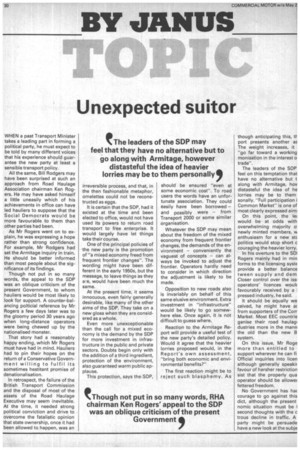Unexpected suitor
Page 40

If you've noticed an error in this article please click here to report it so we can fix it.
The leaders of the SDP may feel that they have no alternative but to go along with Armitage, however distasteful the idea of heavier lorries may be to them personally,
WHEN a past Transport Minister takes a leading part in forming a political party, he must expect to be told by many different voices that his experience should guarantee the new party at least a sensible transport policy.
All the same, Bill Rodgers may have been surprised at such an approach from Road Haulage Association chairman Ken Rogers. He may have asked himself a little uneasily which of his achievements in office can have led hauliers to suppose that the Social Democrats would be more favourable to them than other parties had been.
As Mr Rogers went on to explain, he was expressing a hope rather than strong confidence. For example, Mr Rodgers had set the Armitage inquiry in train. He should be better informed than most people about the significance of its findings.
Though not put in so many words, the appeal to the SDP was an oblique criticism of the present Government, to whom hauliers would be most likely to look for support. A counter-balancing polticial reference by Mr Rogers a few days later was to the gloomy period 30 years ago when long-distance operators were being chewed up by the nationalised monster.
That story had a reasonably happy ending, which Mr Rogers must have had in mind. Hauliers had to pin their hopes on the return of a Conservative Government willing to fulfil its sometimes hestitant promise of denationalisation.
In retrospect, the failure of the British Transport Commission and the disposal of most of the assets of the Road Haulage Executive may seem inevitable. At the time, it needed strong political conviction and drive to • overcome the fatalistic opinion that state ownership, once it had been allowed to happen, was an irreversible process, and that, in the then fashionable metaphor, omelettes could not be reconstructed as eggs.
It is certain that the SDP, had it existed at the time and been elected to office, would not have used its powers to return road transport to free enterprise. It would largely have let things take their course.
One of the principal policies of the new party is the promotion of "a mixed economy freed from frequent frontier changes". The wording might have been different in the early 1950s, but the message, to leave things as they a -e, would have been much the same.
At the present time, it seems innocuous, even fairly generally desirable, like many of the other aims of the SDP. They take on a new gloss when they are considered as a whole.
Even more unexceptionable than the call for a mixed economy is the demand by the SDP for more investment in infrastructure in the public and private sectors. Doubts begin only with the addition of a third ingredient, protection of the environment, also guaranteed warm public applause.
This protection, says the. SDP, should be ensured "even at some economic cost". To road users the words have an unfortunate association. They could easily have been borrowed — and possibly were — from Transport 2000 or some similar .organisation.
Whatever the SDP may mean about the freedom of the mixed economy from frequent frontier changes, the demands of the environment — conveniently the vaguest of concepts — can always be invoked to adjust the frontier. Operators hardly need to consider in which direction the adjustment is likely to be made.
Opposition to new roads also is invariably on behalf of this same elusive environment. Extra investment in "infrastructure" would be likely to go somewhere else. Once again, it is not difficult to guess where.
Reaction to the Armitage Report will provide a useful test of the new party's detailed policy. Would it agree that the heavier lorries proposed would, in the Report's own assessment, "bring both economic and environmental benefits?"
The first reaction might be to reject such blasphemy. As though anticipating this, th port presents another aE The weight increases, it "go far toward a working monisation in the interest o trade".
The leaders of the SDP feel on this temptation that have no alternative but t along with Armitage, hov distasteful the idea of he lorries may be to them sonally. "Full participation i Common Market" is one of most clearly expressed aim!
On this point, the lei would be at odds with overwhelming majority ()newly minted members, enthusiasm for a new stz politics would stop short c couraging the heavier lorry.
In his overture to the SDI Rogers mainly had in min forms to the licensing systE provide a better balance tween supply and dem Closer control over the issi operators' licences woul( favourably received by a I pressed industry, he said.
It should be equally we ceived, he might have ac from supporters of the Corr Market. Most EEC countrie ganise their road haulagi dustries more in the mann the old than the new B system.
On this issue, Mr Roge more than entitled to support wherever he can fi Official inquiries into licen although generally speakir favour of harsher restriction sist that the properly qua operator should be allowe( fettered freedom.
No Government has ha( courage to go against this dict, although the present nomic situation must be I second thoughts with the c trous decline in traffic. A party might be persuade have a new look at the subje
















































































































